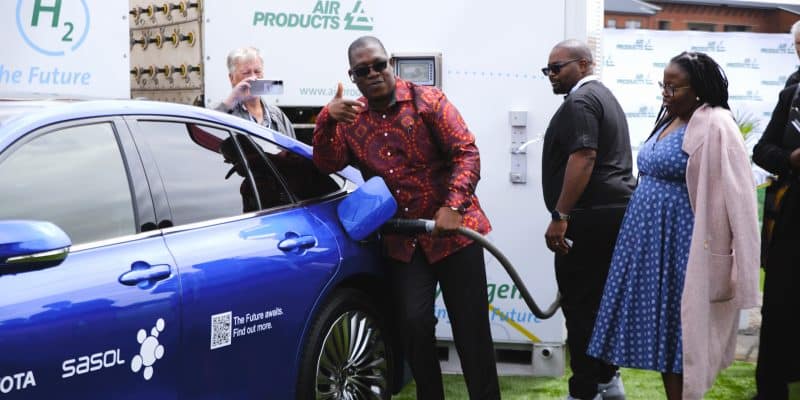Sasol, the South African chemicals giant, recently demonstrated the fruit of its collaboration with Toyota South Africa Motors (TSAM) and Air Products South Africa (APSA). This is an electric car powered by a green hydrogen fuel cell.
The second-generation Toyota Mirai (FCEV) was unveiled at the recently concluded Smart Mobility Africa Summit in Johannesburg, South Africa. This electric vehicle is powered by a green hydrogen fuel cell developed as part of a partnership between South African chemical giant Sasol, the South African subsidiary of Japanese carmaker Toyota and that of American industrial group Air Products.
The FCEV is fuelled by hydrogen produced by Sasol from a 3 MWp photovoltaic solar power plant. “This will be complemented by a 69 MW supply of renewable energy from a wind farm in the Eastern Cape in 2024, to increase production to 3,500 tonnes per day,” explains Priscillah Mabelane, Sasol’s Executive Vice President for Energy.
A solution for the energy transition
This hydrogen is distributed using technology supplied by Air Products. For Sasol, this is a sustainable alternative that can decarbonise the transport sector by electrifying long-haul trucks, buses and mining fleets.
Read also- SOUTH AFRICA: Sasol and ArcelorMittal focus on hydrogen for decarbonisation
This is a major step forward in the development of sustainable transport in South Africa, thanks to Toyota, one of the pioneers in the development of hydrogen mobility worldwide. The Japanese giant has been researching this technology since 1992.
Proven technology
“Toyota has sold more than 25,000 fuel cell electric vehicles since then. In fact, a prototype of the FCEV was used in a static display at the World Summit on Sustainable Development in Johannesburg in 2002,” explains Andrew Kirby, President and CEO of TSAM.
For the record, the partnership between TSAM and Sasol was signed in 2021, with a view to developing a transport corridor, and extending the demonstration to a pilot project using one of South Africa’s main freight corridors, namely National Road 3 (N3) between Durban and Johannesburg, for long-distance trucks powered by green hydrogen. Since then, Sasol has also formed partnerships with various other players to decarbonise the South African economy through green hydrogen. These include ArcelorMittal, the global steel giant, and even the Japanese company Itochu, which wants to invest in South Africa.
Jean Marie Takouleu





